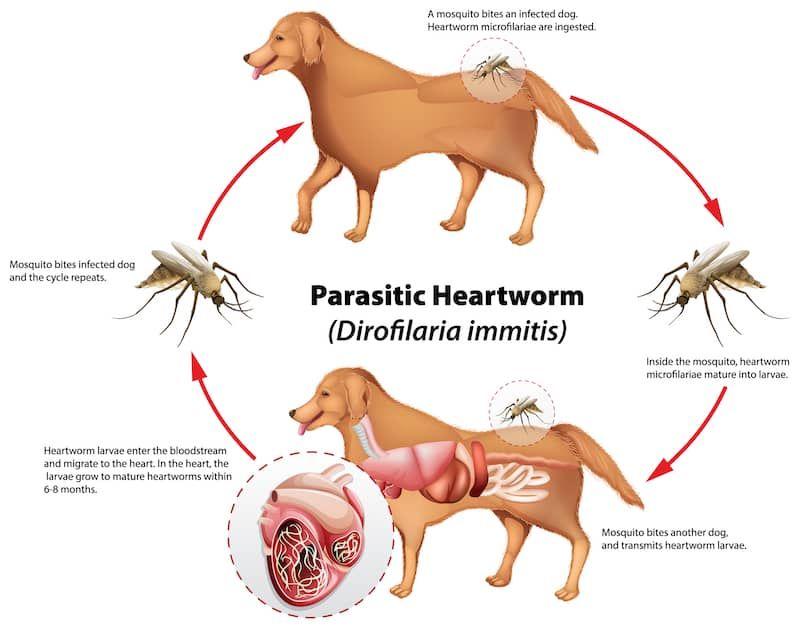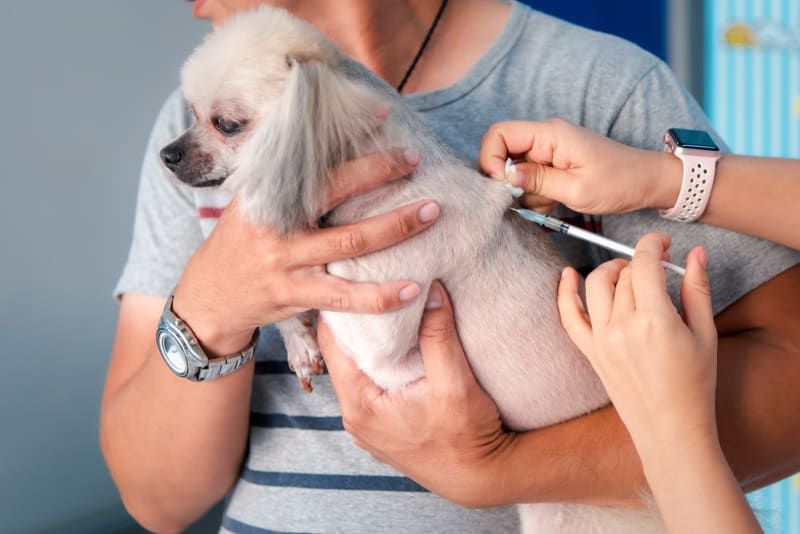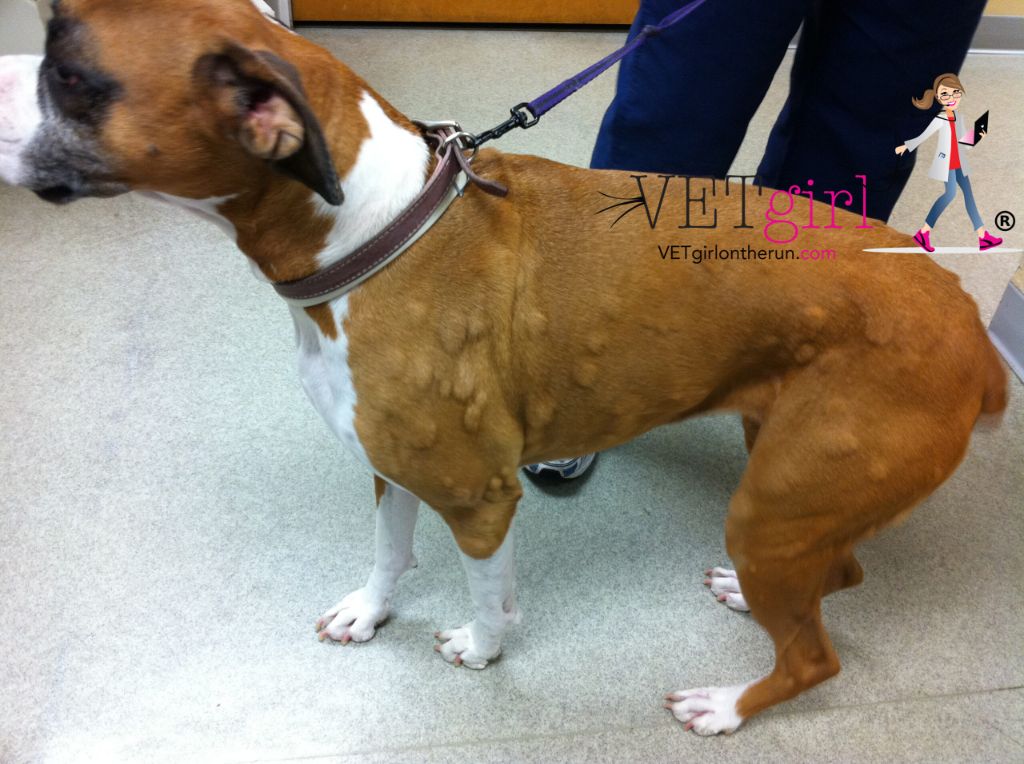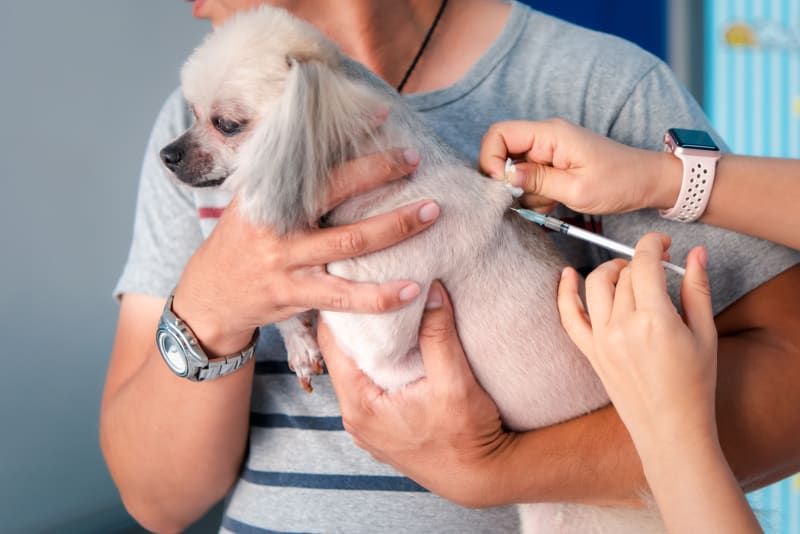Introduction
Heartworm disease is a serious and potentially fatal condition caused by parasitic worms called Dirofilaria immitis that live in the heart, lungs, and associated blood vessels of affected pets. Mosquitoes transmit the infective larvae of the parasite to dogs and cats through bites. Once inside the body, the larvae develop into adult worms that mate and produce offspring, which can cause severe damage to the heart, lungs, and pulmonary vessels.
There are several FDA-approved heartworm preventatives available that kill the larvae before they develop into adults. These medications, typically given monthly, are highly effective when administered year-round according to the label’s instructions. However, they can cause severe adverse reactions if given to a pet already infected with adult heartworms.
This article provides an overview of heartworm disease and what happens if an infected dog is mistakenly given heartworm medication meant for prevention.
What are Heartworms?
Heartworms are parasitic roundworms called Dirofilaria immitis that live in the heart and pulmonary arteries of dogs. Mosquitoes transmit the heartworm larvae by biting infected dogs and picking up the microscopic larvae circulating in their blood. The mosquito then becomes infected with the larvae. The next time the mosquito feeds (on any dog), it injects the infectious larvae into the dog’s skin. It takes about 6-7 months for the larvae to mature into adult heartworms living inside the dog’s heart. An infected dog can have dozens of worms in their cardiovascular system, which can lead to severe lung, heart, liver, and kidney damage [1].
Signs and Symptoms
A heartworm infection can cause a variety of symptoms in dogs, ranging from mild to severe depending on the number of worms present and how long the dog has been infected. Some of the most common signs of a heartworm infection include:

- A mild, persistent cough that may get worse with exercise
- Fatigue and tiring more easily during walks or play
- Reduced appetite and weight loss
- Sluggishness and lethargy
- Shortness of breath
- Vomiting
- Rapid or difficult breathing
- Strained breathing or wheezing
In the early stages of the disease, dogs may show few or very mild symptoms. But as more worms accumulate in the heart and pulmonary arteries, signs progress and become more noticeable. Dogs with advanced infections may cough almost constantly and show pronounced lethargy and weight loss. Severely infected dogs are at risk for congestive heart failure. Dogs in heart failure may faint or pass out from lack of oxygen. They often cough up blood-tinged sputum and show fluid buildup in lungs and abdomen. If a heartworm infection goes untreated, it can be fatal.
Sources:
https://heartgard.com/signs-of-heartworms-in-dogs
https://www.heartwormsociety.org/heartworms-in-dogs
Diagnosis
There are several tests vets use to diagnose heartworm infection in dogs. The most common is an antigen test that detects proteins secreted by adult female heartworms. The antigen test only requires a small blood sample and is very accurate at detecting infections of at least 5-month duration or longer when female worms are present (VCA Hospitals). It does not detect the presence of immature heartworms or male heartworms.
Other diagnostic tests include microfilaria tests and X-rays. Microfilaria tests look for baby heartworms in the blood by examining a blood sample under a microscope. However, many dogs with heartworms will not test positive on this test (Heartworm Society). X-rays can reveal signs of heart damage and inflammation caused by heartworm disease. However, heartworms themselves are not visible on X-rays.
Veterinarians may run multiple tests to confirm a diagnosis, since no single test is 100% definitive. However, the antigen and microfilaria tests together can reliably diagnose most heartworm infections. Regular screening is important since early detection greatly improves treatment success.
Treatment
Treating heartworms in dogs is a complex and potentially risky process. The main treatment involves administering a drug called an adulticide that is designed to kill the adult heartworms. The most common adulticide used is melarsomine, which is given through a series of injections (VCA Animal Hospitals).

The adulticide treatment kills the heartworms, but their dead bodies can cause potentially fatal complications. As the worms die, they break up and can obstruct blood flow to the lungs. To reduce this risk, dogs are given corticosteroids and rest for a month before and after treatment to calm the immune response and decrease inflammation. Even with these precautions, there is still a risk of severe reactions when the heartworms die, so dogs must be monitored very closely during and after treatment (American Heartworm Society).
Treatment also includes medications to kill juvenile heartworms and microfilaria to prevent further infestation. In very severe cases that put the dog at high risk during adulticide treatment, the vet may stabilize the dog first before administering the heartworm killing drugs.
The entire process can take several months from diagnosis to full recovery. Success rates are high when treatment guidelines are carefully followed, but there are some risks involved. It’s imperative to discuss all options thoroughly with your veterinarian and follow their treatment plan and recovery instructions exactly.
Prevention
Preventing heartworm infection in dogs is extremely important and the most effective way to protect your pet (Heartworm Prevention for Dogs). There are several FDA-approved heartworm prevention medications available that require a prescription from your veterinarian (Heartworm Disease – FDA). These medications come in oral and topical formulas and should be administered year-round, even in winter when mosquitos are less active.
Heartworm preventatives work by killing immature heartworms called microfilariae that have infected the dog in the past 30-45 days. It is imperative to never miss a dose, as even one missed dose creates an opportunity for infection. These medications are safe and effective when used as prescribed, but should not be given to a dog who already has adult heartworms. Doing so can cause severe adverse reactions and potentially death. This is why testing for heartworms prior to starting prevention is so important.
Discuss heartworm prevention with your veterinarian to determine the best medication and dosing schedule for your dog. Compliance with prevention is the best way to keep your pet protected from this serious, progressive disease. Do not take shortcuts or try over-the-counter products, as they are not proven effective. Prevention requires veterinary oversight and consistency on the owner’s part. Make heartworm prevention a priority all year long.
What Happens if Infected Dog Takes Heartworm Medication?

Giving heartworm medication to a dog already infected with heartworms can lead to severe complications and even be fatal in some cases. The medication is designed to kill heartworm larvae but can have adverse reactions when adult worms are present.Some potential risks and complications include:
Heartworm die-off: When heartworms start dying, they release toxins into the dog’s bloodstream which can cause dangerous complications like blood clots leading to stroke or pulmonary embolism. This puts extreme stress on the lungs, heart, liver and kidneys.[1]
Embolisms: Dead worms can lodge in the arteries of the lungs, blocking normal blood flow. This is extremely dangerous and life-threatening.[2]
Shock: Sudden die-off of many worms at once can cause hypotension, vomiting, and diarrhea leading to shock. The dog may collapse or show labored breathing.[3]
Liver damage: The dog’s liver has to filter out the dead worms and toxins which puts great strain on this organ.[1]
Kidney dysfunction: similarly kidneys are tasked with flushing out worm debris and can be damaged in the process.[2]
It’s important to test dogs for heartworms first before starting any preventative medication. Treatment for active infections requires strict veterinary supervision, not at-home medication. An infected dog given heartworm medication without prior testing risks serious complications or death.
Seeking Emergency Care
If your dog shows signs of a severe reaction after taking heartworm medication, seek emergency veterinary care immediately. Severe reactions can include vomiting, diarrhea, seizures, inability to stand or walk, pale gums, swelling of the face/legs, or collapse. These reactions indicate a dangerous drop in blood pressure and the body going into shock, which can be fatal if not treated right away (Source: https://vecc24.com/heartworm-101-dogs-cats/).
Other emergency symptoms include coughing up blood, sudden weakness or lethargy, fainting, and abnormal fluid buildup in the abdomen or lungs. These can be signs of heartworms dying off and causing damage as they break apart and travel through the bloodstream. Without prompt care, a dog can suffer respiratory failure, heart failure, or sudden death from a dying worm obstructing blood flow (Source: https://www.matthews.carolinavet.com/site/pet-health-blog/2021/08/15/heartwarm-treatment-dogs-side-effects/).
If your dog exhibits any concerning symptoms within a few hours of taking heartworm medication, don’t hesitate to call your vet or visit an emergency animal hospital right away. Prompt treatment with medications, oxygen support, and monitoring can help manage the reaction and prevent a life-threatening crisis.
Aftercare and Monitoring
Proper aftercare is crucial following heartworm treatment to help your dog fully recover. The medication used to kill the heartworms causes significant inflammation, damage, and death of the worms. This can be very hard on your dog’s body.

It’s important to restrict your dog’s activity for at least 4-6 weeks after treatment to allow their body to heal and prevent lung damage from decomposing worms (Source 1). Keep your dog calm, providing lots of rest with only short leash walks to go to the bathroom. No running, jumping, playing, or other strenuous activity should occur during the recovery period.
Your vet will want to see your dog for several follow-up appointments after treatment. Bloodwork and x-rays will be done to monitor progress as the dog’s body absorbs the dead worms. It can take many months for the dog to fully recover (Source 2).
You may need to give additional medications prescribed by your vet to manage pain or inflammation. Watch for signs of breathing trouble, lethargy, swelling, or other reactions and contact your vet immediately if concerns arise. With proper aftercare, most dogs make a full recovery within a few months.
Prevention is Key
As the old saying goes, an ounce of prevention is worth a pound of cure. This is especially true when it comes to deadly heartworm disease. While treatment is possible for dogs diagnosed with heartworms, it is a difficult, expensive, and risky process. The American Heartworm Society and veterinarians strongly recommend year-round heartworm prevention medication for all dogs and cats.
Giving your dog monthly heartworm prevention medication is the easiest and most effective way to protect them from ever contracting this dangerous parasite. Oral and topical preventives are highly effective when given correctly, with some formulas approaching 100% efficacy. They are also very safe and cause minimal side effects in most pets.
Prevention also saves you money in the long run. The cost of prevention medication is far less than paying for diagnostics, hospitalization, and treatment if your dog becomes infected. And you avoid the emotional toll of having a beloved pet go through a difficult illness.
Work closely with your veterinarian to choose the right heartworm prevention product and dosing schedule for your dog. Make sure to test annually to ensure your dog remains negative. While preventives are highly effective, they are not foolproof. But used properly, they offer excellent protection to keep your dog safe and healthy for years to come.
